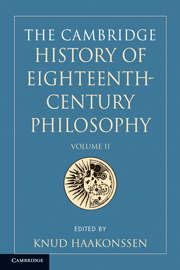29 - The Study of Nature
from IV - Natural Philosophy
Published online by Cambridge University Press: 28 March 2008
Summary
On the map of knowledge which the eighteenth century inherited from long centuries of scholastic instruction and debate, natural philosophy or ‘physics’ occupied a large and prominent place. The university culture of the High Middle Ages had absorbed much of the Aristotelian canon into four main compartments: metaphysics – the study of being as such; ‘physics’ – the study of being as qualified; logic; and ethics. Thus a form of education was created whose imprint was still evident at the beginning of the eighteenth century despite the great intellectual upheavals of the seventeenth century. At most universities the arts students (including those who subsequently undertook postgraduate education in medicine, law, or theology) were exposed to a curriculum which – despite some modifications prompted by Renaissance humanism – was still very largely dominated by such philosophical canons. Moreover, as confidence waned in the possibility of the unaided human intellect to arrive at worthwhile conclusions in the fields of ethics or metaphysics – particularly in Protestant cultures with their emphasis on the fallibility of the human mind – the study of natural philosophy waxed in importance.
The weight of tradition, then, accorded natural philosophy an important place in the mental furniture of the elite, and the domain accorded to it was extremely broad. Natural philosophy in the scholastic tradition embraced the study of all natural things both organic and inorganic. Aristotle and his innumerable scholastic commentators and disputants had sought to provide a priori, qualitative explanations about such fundamental concepts as form, matter, cause, and motion which could be used to explain all natural phenomena.
- Type
- Chapter
- Information
- The Cambridge History of Eighteenth-Century Philosophy , pp. 854 - 872Publisher: Cambridge University PressPrint publication year: 2000
References
- 1
- Cited by

